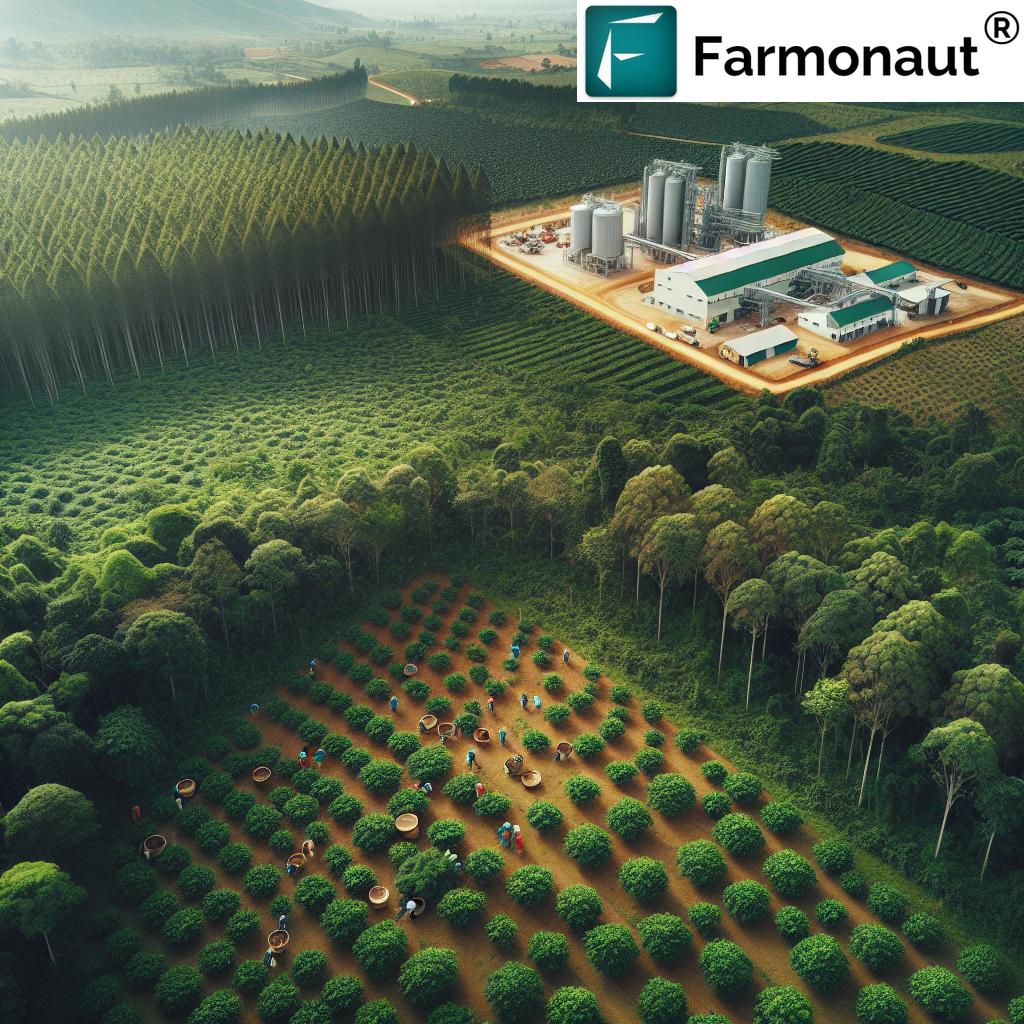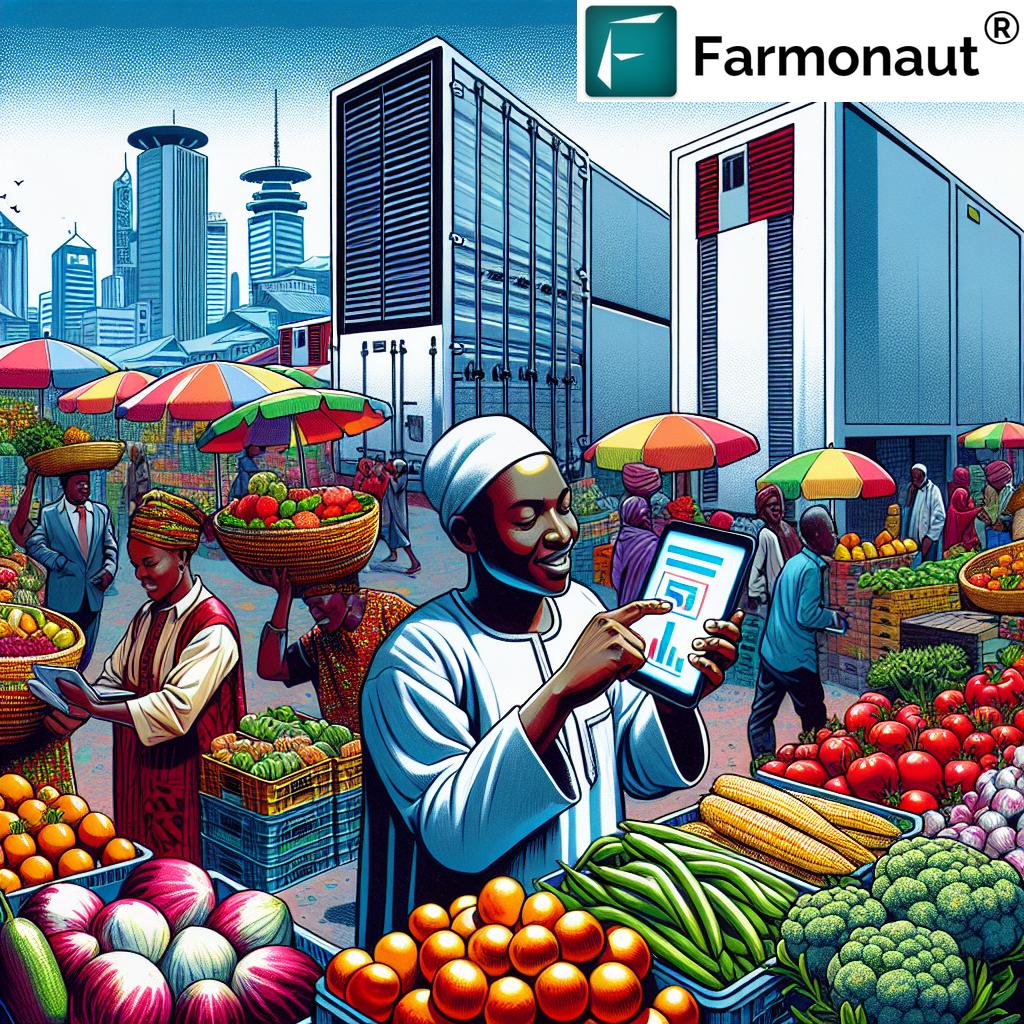Boosting African Coffee: Tanzania Leads 20% Global Production Goal by 2030
“Africa aims to increase its global coffee production share from 11% to 20% by 2030, a significant 81.8% growth.”
We, as representatives of the African coffee industry, are witnessing a transformative moment in the continent’s agricultural landscape. The 3rd G25 African Coffee Summit in Dar es Salaam has set the stage for an ambitious journey to reclaim Africa’s position in the global coffee market. With a resolute commitment to increase the continent’s share of global coffee production to 20% by 2030, African nations are poised to revolutionize their coffee sectors and create a lasting impact on the global coffee trade.
The Current State of African Coffee Production
Before we delve into the strategies and initiatives discussed at the summit, it’s crucial to understand the current state of African coffee production:
- Africa currently accounts for only 11% of global coffee production
- This marks a significant decline from 25% in the 1960s
- The continent exports coffee worth $3 billion but imports coffee products worth $50 billion
- Coffee remains the livelihood for 60 million people in Africa
- Intra-African coffee trade stands at a mere 15%
These statistics highlight the urgent need for a paradigm shift in the African coffee sector. The challenges are numerous, including climate change, pests, diseases, aging farmers, and limited value addition. However, the potential for growth and transformation is immense.

Key Strategies to Boost African Coffee Production
At the heart of the summit’s discussions were several key strategies aimed at revitalizing the African coffee sector:
1. Increasing Productivity and Yields
One of the primary focuses of the summit was addressing the low productivity that has hindered Africa’s competitiveness in the global coffee market. To achieve this, several initiatives were proposed:
- Investment in research to develop disease-resistant coffee varieties
- Adoption of better farming technologies and practices
- Provision of subsidies for coffee seedlings and fertilizers to support smallholder farmers
- Implementation of climate-smart agriculture techniques to mitigate the impact of climate change
These efforts are crucial in boosting coffee yields and ensuring that African coffee remains competitive in the global market. By leveraging advanced technologies and sustainable farming practices, we can significantly increase our output while maintaining the high quality that African coffee is known for.
2. Enhancing the Coffee Value Chain
A key resolution from the summit was the need to move beyond raw material exports and focus on value addition. This shift is essential for capturing a larger share of the global coffee market and increasing the economic benefits for African nations. Some of the proposed strategies include:
- Revamping local coffee processing facilities, such as Tanzania’s Instant Coffee Company (TANICA)
- Empowering coffee cooperatives to engage in processing and value addition
- Promoting local coffee consumption to create a more sustainable coffee economy
- Developing unique African coffee brands to enhance market presence and value
By focusing on these aspects, we can transform our coffee sector from a primarily raw material exporter to a producer of high-value coffee products, thereby capturing a larger share of the global coffee value chain.
3. Attracting Youth to Agribusiness
Addressing the challenge of an aging farmer population was a significant topic at the summit. To ensure the long-term sustainability of the coffee sector, it’s crucial to make coffee farming attractive to the younger generation. Some initiatives discussed include:
- Implementation of modern agribusiness models that appeal to youth
- Provision of training and support for young agripreneurs
- Integration of technology in coffee farming to make it more appealing to tech-savvy youth
- Creation of financial incentives and support mechanisms for young farmers
Tanzania’s Build Better Tomorrow (BBT) programme, which provides free land and training to young agripreneurs, serves as an excellent example of such initiatives. By attracting youth to the coffee sector, we can ensure a continuous supply of skilled labor and innovative ideas to drive the industry forward.
4. Leveraging Technology for Sustainable Coffee Agriculture
In the era of digital transformation, leveraging technology is crucial for the advancement of the African coffee sector. Innovative solutions can help address many of the challenges faced by coffee farmers and enhance overall productivity. One such solution is provided by Farmonaut, a pioneering agricultural technology company that offers advanced, satellite-based farm management solutions.
Farmonaut’s platform provides valuable services such as:
- Real-time crop health monitoring using satellite imagery
- AI-based advisory systems for personalized farm management
- Blockchain-based traceability for enhanced supply chain transparency
- Resource management tools for optimized farming operations
These technologies can significantly benefit African coffee farmers by providing them with data-driven insights, improving decision-making, and ultimately increasing yields and quality. By adopting such innovative solutions, we can accelerate the transformation of the African coffee sector and achieve our ambitious production goals.
5. Promoting Sustainable Coffee Farming Practices
Sustainability was a key theme throughout the summit, with a focus on promoting environmentally friendly and economically viable coffee farming practices. Some of the strategies discussed include:
- Adoption of agroforestry systems to enhance biodiversity and soil health
- Implementation of water conservation techniques
- Promotion of organic farming methods to reduce chemical inputs
- Development of climate-resilient coffee varieties
These sustainable practices not only help in mitigating the impacts of climate change but also align with the growing global demand for sustainably produced coffee. By positioning African coffee as a leader in sustainable production, we can capture premium markets and ensure the long-term viability of our coffee sector.
“The 3rd G25 African Coffee Summit in Tanzania addresses challenges for 25 coffee-producing nations, representing 45% of Africa’s countries.”
Tanzania’s Approach: A Model for African Coffee Revival
Tanzania’s proactive approach to reviving its coffee sector serves as an inspiring model for other African nations. The country has implemented several initiatives that address the key challenges facing the industry:
- Strengthening coffee research institutions to combat pests, diseases, and climate-related threats
- Introducing coffee seedlings and fertilizer subsidies to support smallholder farmers
- Launching the Build Better Tomorrow (BBT) programme to attract youth to coffee farming
- Setting a target to increase local coffee consumption from 7% to 15% by 2030
- Revamping Tanzania Instant Coffee Company (TANICA) to boost local processing capabilities
These initiatives demonstrate a comprehensive approach to addressing the various challenges facing the coffee sector, from production to consumption. By implementing similar strategies, other African nations can accelerate their journey towards increased coffee production and market share.

The Role of Technology in Transforming African Coffee Farming
As we strive to achieve our ambitious production goals, the role of technology in transforming African coffee farming cannot be overstated. Innovative solutions like those offered by Farmonaut can play a crucial role in this transformation. Let’s explore how these technologies can benefit the African coffee sector:
Satellite-Based Crop Health Monitoring
Farmonaut’s satellite-based crop health monitoring system provides coffee farmers with valuable insights into their crops’ health status. This technology allows farmers to:
- Monitor vegetation health using NDVI (Normalized Difference Vegetation Index)
- Track soil moisture levels
- Identify potential pest or disease outbreaks early
- Make informed decisions about irrigation and fertilizer application
By leveraging this technology, African coffee farmers can optimize their crop management practices, leading to improved yields and quality.
AI-Driven Advisory Systems
The Jeevn AI advisory system offered by Farmonaut provides personalized farm management advice based on real-time data analysis. For coffee farmers, this can mean:
- Customized recommendations for pest and disease management
- Optimal timing for various farming activities based on weather forecasts
- Tailored advice for improving coffee quality and yield
Such AI-driven systems can significantly enhance decision-making processes for farmers, leading to more efficient and productive coffee farming practices.
Blockchain-Based Traceability
Farmonaut’s blockchain-based traceability solution can revolutionize the African coffee supply chain by:
- Ensuring transparency from farm to cup
- Enhancing consumer trust in African coffee
- Facilitating fair trade practices
- Enabling premium pricing for high-quality, traceable coffee
This technology aligns perfectly with our goal of moving up the value chain and capturing a larger share of the global coffee market.
Resource Management Tools
Efficient resource management is crucial for sustainable coffee farming. Farmonaut’s tools can help African coffee farmers:
- Optimize water usage through precise irrigation scheduling
- Manage fertilizer application more effectively
- Track and reduce carbon footprint
- Improve overall farm efficiency
By adopting these advanced technologies, we can make significant strides towards our goal of increasing Africa’s share of global coffee production to 20% by 2030.
The African Continental Free Trade Area (AfCFTA) and Coffee Trade
The African Continental Free Trade Area (AfCFTA) represents a significant opportunity for the growth of intra-African coffee trade. As highlighted at the summit, there’s a need to increase intra-African coffee trade from the current 15% to at least 50%. The AfCFTA can facilitate this by:
- Reducing trade barriers between African nations
- Harmonizing coffee quality standards across the continent
- Facilitating the movement of coffee and related products across borders
- Encouraging investment in coffee processing facilities across Africa
By leveraging the AfCFTA, we can create a more robust and integrated African coffee market, reducing our dependence on external markets and capturing more value within the continent.
Comparative Table: African Coffee Production – Current vs. 2030 Target
| Metric | Current (2023) | 2030 Target |
|---|---|---|
| Africa’s Share of Global Coffee Production (%) | 11% | 20% |
| Estimated Annual Production (million tons) | 1.5 | 2.7 |
| Number of Coffee-Producing Countries | 25 | 30 |
| Average Yield (tons/hectare) | 0.5 | 0.9 |
| Smallholder Farmers’ Market Share (%) | 80% | 70% |
| Youth Involvement in Coffee Farming (%) | 15% | 40% |
| Sustainable Farming Practices Adoption Rate (%) | 30% | 80% |
This table clearly illustrates the ambitious targets set for the African coffee sector by 2030. Achieving these goals will require concerted efforts from all stakeholders, including governments, farmers, agribusinesses, and technology providers like Farmonaut.
Challenges and Solutions in Achieving the 2030 Goal
While the goal of increasing Africa’s share of global coffee production to 20% by 2030 is ambitious, it’s not without challenges. Let’s explore some of these challenges and potential solutions:
Climate Change
Challenge: Climate change poses a significant threat to coffee production, with changing rainfall patterns and increasing temperatures affecting crop yields and quality.
Solution: Adoption of climate-smart agriculture practices, development of drought-resistant coffee varieties, and use of technology for precise resource management. Farmonaut’s satellite monitoring and AI advisory systems can play a crucial role in helping farmers adapt to changing climate conditions.
Aging Farmer Population
Challenge: The average age of coffee farmers in Africa is increasing, with few young people showing interest in coffee farming.
Solution: Implementation of youth-focused programs like Tanzania’s BBT, integration of technology in farming practices to make it more appealing to youth, and provision of financial incentives for young farmers.
Limited Access to Finance
Challenge: Many smallholder farmers lack access to credit and financial resources needed to invest in their farms and adopt new technologies.
Solution: Development of innovative financing models, partnerships with financial institutions, and use of technology to reduce lending risks. Farmonaut’s satellite-based verification for crop loans can play a significant role in improving farmers’ access to finance.
Pest and Disease Management
Challenge: Coffee crops are susceptible to various pests and diseases, which can significantly impact yields and quality.
Solution: Investment in research for disease-resistant varieties, implementation of integrated pest management practices, and use of technology for early detection of pest and disease outbreaks. Farmonaut’s crop health monitoring system can help farmers identify and address these issues promptly.
The Road Ahead: Implementing the Summit’s Resolutions
As we move forward from the 3rd G25 African Coffee Summit, the focus shifts to implementing the resolutions and strategies discussed. Here are some key steps that need to be taken:
- Development of national action plans aligned with the 2030 goal
- Establishment of a continental monitoring and evaluation system to track progress
- Creation of public-private partnerships to drive investment in the coffee sector
- Harmonization of coffee policies and standards across African nations
- Investment in research and development to address sector-specific challenges
- Implementation of capacity-building programs for farmers and other stakeholders
By taking these steps and leveraging innovative technologies like those offered by Farmonaut, we can set the African coffee sector on a path to sustainable growth and increased global market share.
Conclusion: A Bright Future for African Coffee
The 3rd G25 African Coffee Summit in Dar es Salaam has set the stage for a transformative journey in the African coffee sector. With ambitious goals, innovative strategies, and a commitment to leveraging technology, we are poised to reclaim our position in the global coffee market.
By focusing on increasing productivity, enhancing the value chain, attracting youth to agribusiness, and promoting sustainable farming practices, we can overcome the challenges facing our coffee sector and achieve our goal of 20% global market share by 2030.
The road ahead is challenging, but with concerted efforts from all stakeholders and the adoption of innovative solutions like those offered by Farmonaut, we can create a thriving, sustainable, and globally competitive African coffee industry.
As we embark on this exciting journey, let’s remember that every cup of African coffee represents not just a rich, flavorful beverage, but also the hopes, dreams, and hard work of millions of African farmers. Together, we can ensure that African coffee takes its rightful place on the global stage, bringing prosperity to our farmers and delight to coffee lovers worldwide.
Frequently Asked Questions (FAQ)
- What is the current share of African coffee in global production?
Currently, Africa accounts for 11% of global coffee production. - What is the target for African coffee production by 2030?
The goal is to increase Africa’s share of global coffee production to 20% by 2030. - How many people in Africa depend on coffee for their livelihood?
Coffee remains the livelihood for approximately 60 million people in Africa. - What are some of the main challenges facing African coffee production?
Key challenges include climate change, pests and diseases, an aging farmer population, and limited value addition. - How can technology help in transforming the African coffee sector?
Technologies like satellite-based crop monitoring, AI advisory systems, and blockchain-based traceability can significantly improve productivity, sustainability, and market access for African coffee farmers. - What role does the African Continental Free Trade Area (AfCFTA) play in coffee trade?
The AfCFTA can facilitate increased intra-African coffee trade by reducing trade barriers, harmonizing standards, and encouraging investment in processing facilities across the continent. - How is Tanzania leading the way in coffee sector revival?
Tanzania has implemented several initiatives, including strengthening research institutions, providing subsidies to smallholder farmers, attracting youth to coffee farming, and boosting local coffee consumption. - What is being done to attract youth to coffee farming?
Initiatives include implementing modern agribusiness models, providing training and support for young agripreneurs, and integrating technology in coffee farming to make it more appealing to tech-savvy youth. - How can sustainable coffee farming practices benefit African producers?
Sustainable practices can help mitigate the impacts of climate change, align with growing global demand for sustainably produced coffee, and ensure the long-term viability of the African coffee sector. - What is the role of value addition in boosting African coffee exports?
Value addition, such as local processing and developing unique African coffee brands, can help capture a larger share of the global coffee market and increase economic benefits for African nations.
For more information on how technology can transform your coffee farming practices, visit Farmonaut or explore our API for advanced agricultural solutions. You can also check out our API Developer Docs for detailed information on integrating our technology into your systems.
















